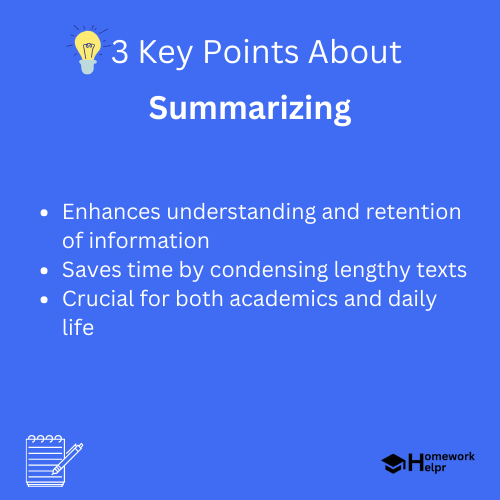📝 Summary
Summarizing is the skill of effectively condensing information into concise formats. This practice not only helps in grasping the main ideas quickly but also enhances understanding and retention. It involves engaging with the material to identify the important points and expressing them in your own words. Effective summarizing is vital for academic success and improves communication skills. Regular practice, determining key points, and being concise can help in mastering this essential skill, making it invaluable for studies and everyday life.
Summarizing: The Art of Condensing Information
In our daily lives, we encounter an enormous amount of information. Whether it‚’ through books, articles, or social media, it‚’ crucial to process this information efficiently. That‚’ where the skill of summarizing comes into play. In simple terms, summarizing involves distilling large amounts of information into a concise format. It helps us grasp the main ideas quickly and effectively.
Summarizing is more than just shortening a text. It requires engaging with the material to determine which points are the most important and relevant. By doing this, you can create a condensed version that retains the essence of the original content. The ability to summarize is vital in both academic and practical settings, helping you in studies and everyday decision-making.
Why is Summarizing Important?
Summarizing is an essential skill for a multitude of reasons:
- Enhances Understanding: By summarizing, you actively engage with the material, which improves comprehension.
- Saves Time: A good summary can save you from reading lengthy texts when you need to grasp ideas quickly.
- Improves Retention: When you summarize, you reinforce the information in your memory, making it easier to recall later.
In academic contexts, summarizing can be crucial for success. For instance, when preparing for an exam, creating summaries of your notes can help reinforce learning and highlight important concepts.
How to Summarize Effectively
To master the art of summarizing, follow these simple steps:
- Read the Text Carefully: Start by reading the entire text to understand the central themes.
- Identify Main Ideas: Pull out the main ideas and supporting details that convey the key message.
- Use Your Own Words: Write the summary using your own language to demonstrate understanding.
- Be Concise: Keep your summary brief while ensuring it captures the essence of the original material.
Following these steps will enable you to create high-quality summaries that are informative and engaging. A useful tip is to limit your summary to about a third of the original text‚’ length, ensuring that the most important points are preserved.
❓Did You Know?
Did you know that effective summarizing can improve your writing skills? By practicing, you learn how to express thoughts clearly and concisely!
Examples of Summarizing
Examples
For instance, an article discussing the effects of climate change might include various statistics and details. A summary could simply state: “Climate change is causing significant alterations in weather patterns, leading to extreme events such as floods and droughts.”
Examples
A long novel can be summarized in a few sentences. For example, “In ‘Cinderella,’ a mistreated girl overcomes her hardships with the help of a fairy godmother and finds love with a prince.”
Common Challenges in Summarizing
While summarizing can be straightforward, it comes with its fair share of challenges:
- Identifying Key Points: It can be difficult to determine which information is essential.
- Over-Summarizing: If one becomes too brief, key details may be lost, affecting clarity.
- Personal Bias: Readers may unintentionally focus on parts that resonate with them, skewing the summary.
Being aware of these challenges can help you develop better summarizing skills. Always strive to remain objective and pay attention to what the text conveys overall.
Practicing Summarizing
To hone your summarizing skills, practice is key. Here are some effective ways to improve:
- Summarize Daily: Pick a news article and summarize it every day.
- Engage in Group Discussions: Discuss topics with peers and summarize key points as a group activity.
- Use Technology: Use summarization apps that help you condense articles for quick understanding.
By consistently applying these practices, you can sharpen your ability to summarize effectively. This will enhance not only your academic performance but also your general skills in communication and critical thinking.
Conclusion
In conclusion, the ability to summarize is a vital communication skill that enables individuals to process and convey information succinctly. Whether for studying, keeping up with news, or sharing knowledge, mastering summarization can lead to greater understanding and improved retention of material. Like any other skill, it requires practice and patience.
Remember, effective summarizing involves identifying key points, expressing them in your own words, and maintaining the original text’s meaning. As you develop this important skill, you‚Äôll find it invaluable in various aspects of life, from academics to everyday conversations.

Related Questions on Summarizing
What is summarizing?
Answer: Summarizing is condensing information into concise formats.
Why is summarizing important?
Answer: It improves understanding, saves time, and enhances retention.
How can I summarize effectively?
Answer: Read carefully, identify main ideas, and be concise.
What challenges might I face in summarizing?
Answer: Key point identification, over-summarizing, and personal bias.
